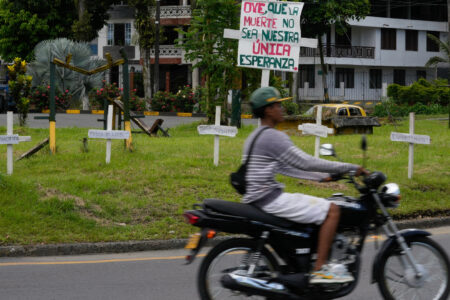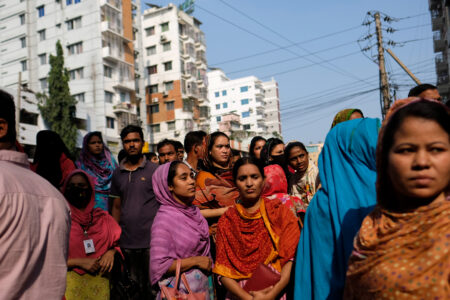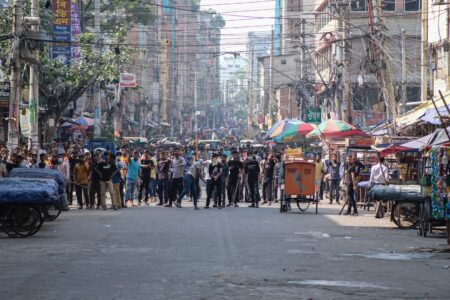
Tip O’Neill was speaking of elections in America when he famously said, ”œAll politics are local.” After the ”œthumpin’” voters handed Republicans November 7 over the war in Iraq, it was widely commented that instead, local American politics have ”œgone global.”
So it goes in Canada, although Iraq is not the divisive issue. Many Canadians question the decisions in 2005 to change the mission of Canadian forces in Afghanistan from peacekeeping in Kabul to peacemaking in Kandahar and to extend the expanded commitment until 2009. They ask if brave Canadians are dying in Afghanistan over local issues not of our making and beyond our capacity to repair.
International security policy objectives run up against local reality all the time. If local constraints and complica- tions abroad defeat large outside designs, the designers pay the price in elections back home.
In Afghanistan, local facts have threatened to gain the upper hand. But the bigger-picture goals for Afghanistan remain as valid as ever. If Afghanistan again becomes a cen- tre of international terrorism it would be a huge setback, potentially costly to Canadians.
We need a better bridge between the global concerns that brought NATO countries to Afghanistan, and the diffi- cult local challenges of effective reform and change.
One bridge is that of ”œadjacency” ”” greater cooperation from neighbouring countries to which local condi- tions in Afghanistan have direct local political relevance, namely Iran and Pakistan.
NATO came to Afghanistan for global, not local, rea- sons. The Taliban government provided al-Qaeda with a base to launch the attack on the United States. It was viewed as state terrorism commanding international action.
The campaign was at first a US- only one, the highly motivated Americans having declined NATO’s offer to help, though they later did ask allies, including Canada, to become directly engaged. The US forces pur- sued al-Qaeda with partial success, and in the process dislodged and broke up the Taliban regime itself. The action was punitive, and in its purpose of destroying al-Qaeda, preventive. The international community supported its goals, respecting the US’s need to reply decisively to the attacks of 9/11.
While the US initially focused on a quick war of reprisal and dismantle- ment, it was soon apparent to all that lasting prevention and security required the creation in Afghanistan of an effective civil society. By November 2001, the international com- munity began a process that led to the re-establishment of the Afghan state, elections, a constitution, and steps to re- construct a society made dys- functional by decades of war, occupation and insurrection. It was nation-building par excellence.
However, neither al-Qaeda nor the Taliban existed in a local vacuum. They were part of a wider phenomenon of growing Islamic consciousness and sense of grievance. Al-Qaeda’s operations from Afghanistan were disrupted. But franchise operations carried on terrorist activity globally, most destructively in Bali, Madrid, and London, where local jihadists were chillingly discovered to be home-grown.
In Afghanistan, it was always understood by participating countries that military action alone was inade- quate to the task of re-building the nation.
The picture today reveals major points of success. Elections produced a parliament that is a force for democra- cy. A quarter of its seats were won by women. Schools have re-opened for 5 million boys and girls. The economy has grown at an average of 17 percent per year since 2002, not counting the lucrative poppy trade. Refugees have returned from around the world, including vitally needed professionals. President Hamid Karzai is a leader who builds confidence abroad, though at home his government’s authority is less convincing the farther one goes from Kabul.
But there are major downsides. First, as we learned in Russia and Eastern Europe after 1989, civil society, the basis of democracy, does not come overnight. It has to be learned. The reflexes of accountability and demo- cratic behaviour are not natural grafts ”” they need a generation to develop.
Afghanistan is especially compli- cated. Apart from its inexperience with democratic governance, the country is ethnically divided among tribes and language groups who inhabit regional strongholds and fiefdoms that have been quasi-independent for centuries.
National governance threatens the status of local warlords, several of whom have aligned with drug traf- fickers who supply 87 percent of the globe’s trade in heroin. In a pattern we have seen in Colombia, the corro- sive effect of profits trumps efforts to achieve national standards of gover- nance. Corruption and violence become the natural order, and a disil- lusioned public seeks safety as a first priority.
It is to this local canvas that a revived Taliban returned in larger, bet- ter equipped units to create an insur- gency emergency in 3 of the 34 Afghan provinces, financed to some extent by the drug traffic. Ex-deputy secretary of state Richard Armitage said that the sit- uation in Iraq is as bad as it looks ”” but that in Afghanistan, it is worse than it looks. If we can’t demonstrate to the public both real security and real, practical improvements in living conditions, many Afghans will conclude that this group of for- eigners and the foreign-backed regime are not the future and they will make their deals with the Taliban and the warlords.
So, British Prime Minister Tony Blair said of Afghanistan in November: ”œHere is where the future of world security in the early 21st century is going to be played out.”
That thought is why we got engaged in Afghanistan in the first place. The costs of the insurgency spreading, Afghanistan failing as a state and becoming again a launch- ing pad for international jihadists would be high.
In contrast, it is hardly contested anywhere today outside the White House and 10 Downing Street that the US invasion of Iraq was a colossal error of judgment.
A special cost was exacted in Afghanistan. By draining forces and resources, the invasion and botched occupation of Iraq meant the effort in Afghanistan was under-resourced, both in security forces and aid resources. Deterrence needs our resources as well as our resolve: as the International Crisis Group has said, ”œThe intervention in Afghanistan has been done on the cheap.”
But the US focus shift to Iraq did finally move responsibility for the mili- tary side of the Afghan operation from the over-extended US to NATO. An unfortunate side effect of multilateral management is that the alliance is unable to deploy its multinational force effectively because of the caveats placed by the governments of some member states on the roles of their contingents: the dangerous burdens of exposure to Taliban insurgents in the restive south has fallen to a few countries, including Canada, while others are confined by the politics back home to safer duty elsewhere. Force protection rather than security has become the preoccupation of too many contributors. This problem is so widely recognized, however, that the NATO Summit in Latvia at the end of November was thought likely to call for a more equitable distribution of the burden.
A problem in all of this is that there is no locale to discuss the relationships and issues involved with all key coun- tries concerned, including China and Russia. The diplomatic influence of the Bush administration is running out and others need to be engaged. But at least the NATO discussion could take account of the wider political canvas, and prompt greater engage- ment of the region.
Even in the unlikely event of an early Israeli- Palestine entente, or a decrease in the violence in Iraq, the motivations of insurgents in Afghanistan would not change. But greater commitment to resolving Middle East issues on the part of the US and others could improve cooperation from other Muslim states with stakes in Afghanistan, notably Iran and Pakistan.
Iran is a unique mixture of theocra- cy and a somewhat mythical-ideological- revolutionary self-belief, which a bizarre leadership moulds around anti- American and anti-Israeli themes in ways that leave little apparent room for compromise. Though the regime in 2003 showed signs of conciliation, which the US ignored, Iranian status and self-confidence have since been greatly boosted by a double win: the demise of the Sunni-dominated regime of Saddam, and then the debilitating entanglement of the US in the insurgency. The Hezbollah challenge to Israel this sum- mer, widely seen in the area as success- ful, was icing on the Iranian cake.
But Iran has traditional national interests that may make it more receptive to reaching helpful compro- mises on both Afghanistan and Iraq. Persian and mostly Shiite Iran is not so confident about its security or influence in the wider region, which is dominat- ed by Arab Sunnis. It may please Iranians that their American adversary is humbled in Iraq, but not that the Sunni insurgency re-creates a hostile state or sub-state on Iran’s border.
Iran would be equally ill-served by the return to power in Afghanistan of the arch-Shiite Taliban, to which Iran was hostile long before the US or Canada paid any attention. Iranian border forces have been fighting the cross-border traf- fic in heroin for years. Iran could use its influence with the Shia minority in Afghanistan in a helpful way.
Can Iran be engaged? They were helpful in 2001 in facilitating the US mil- itary campaign and at the Bonn recon- struction conference. Yet, the Bush administration still has no relations with Iran, nor with Syria, without which progress toward settlement of Middle Eastern issues is very difficult. This should change if in January the Baker-Hamilton report on Iraq calls for the engagement of Iran in stabilizing Iraq. Iran’s nuclear pro- gram and Iran’s cooperation on stabiliz- ing Afghanistan also need to be addressed in the context of Iran’s regional ambi- tions and fear of Washington. It will be a tricky proposition.
Pakistan also has a central role in the Taliban’s capacity to undermine the re-building of Afghanistan. Pakistani leadership has always consid- ered Afghanistan to be within their natural sphere of influence, and the Taliban were to a large extent the cre- ation of Pakistani intelligence services.
It is hotly debated whether Pakistan has done more than turn a blind eye to the Taliban’s revival, by tolerating their headquarters in Quetta and providing recourse to safe Pakistani havens and re- equipment. President Musharraf, who is thought to be beholden to religious par- ties in the border areas who support the Taliban, nonetheless pledges to keep the pressure on the Taliban. However, he insists the West pump much more into the aid effort. He should be held to his word, but we in the West have to lift our game.
The global stakes are high, and it is important they be more clearly commu- nicated in Canada, because Canadians know how to aid, build and develop, which we must do, but we cannot do without also providing essential security via our armed forces until Afghans can take over. The immediate requirement is to increase force presence, not decrease it.
Locally, as winter sets in, the fight- ing will for a time wane. By the time spring arrives, both Afghans and Canadians need to see a brighter picture.
There is no magic bullet to make the Taliban simply disappear. But they can be discouraged by evidence of greater confidence on the part of the Afghan public in their security and hope for a different future. Afghanistan has been an extremely challenging country to govern at any time. It needs our help. All countries, including Afghanistan’s regional neighbours, need to row together, for global reasons as well as for those closer to home.







